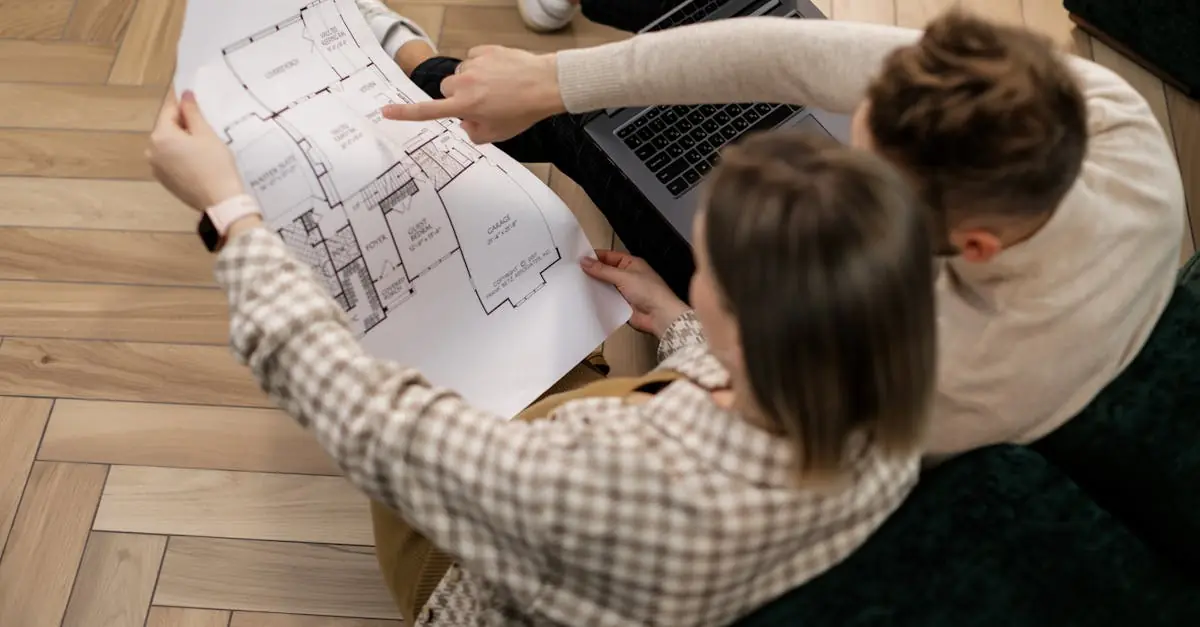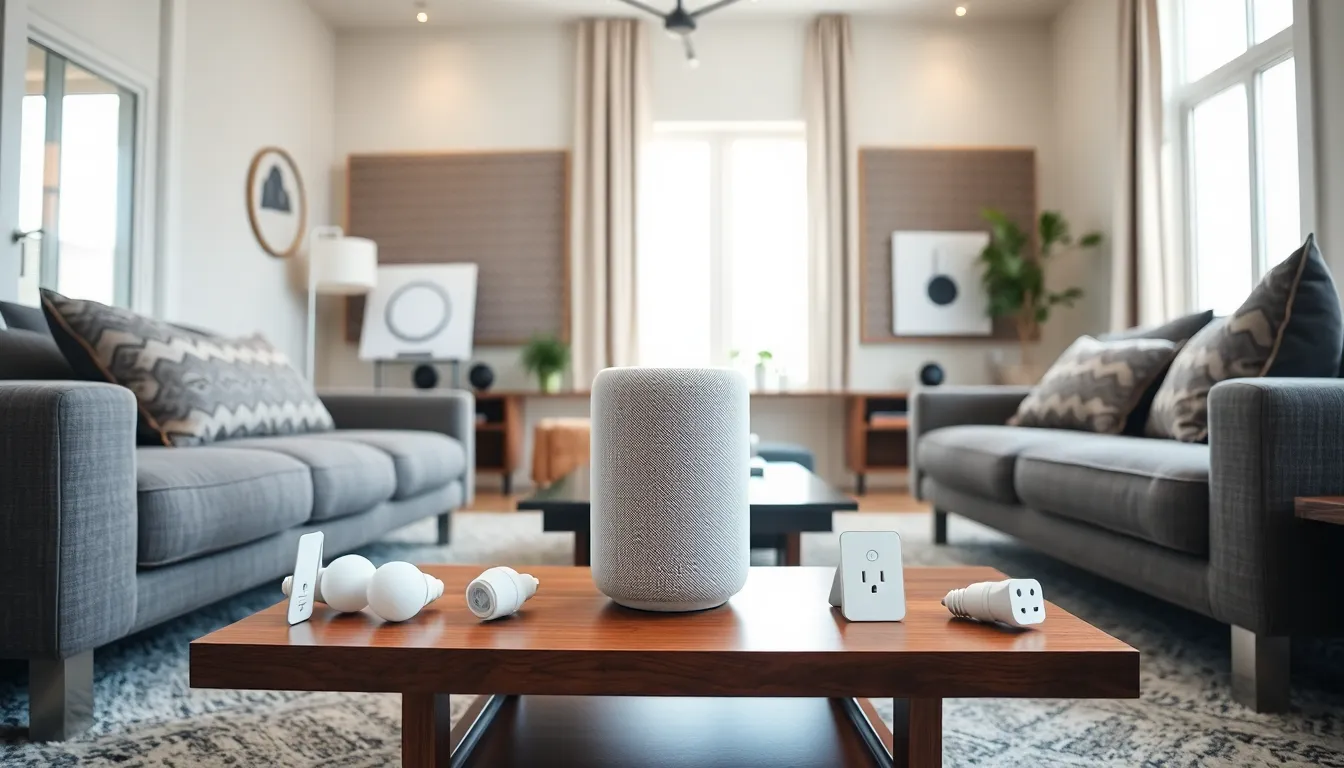Tying the knot is a big deal, but have you thought about what comes next? Sure, love is in the air, but so are the mortgage rates! Buying a home after marriage isn’t just about finding a cozy nest; it’s a joint venture into the wild world of real estate. Picture this: you and your partner, armed with a checklist and a slightly questionable sense of style, navigating open houses like pros.
Table of Contents
ToggleUnderstanding The Importance Of A Home After Marriage
Buying a home after marriage holds significant importance in a couple’s journey. It represents a major investment in their future and a physical space for building a life together. Establishing a home fosters stability and security, essential elements for a healthy relationship.
Creating a sanctuary reflects shared values and goals. Couples often design their living space to fit their unique tastes, enhancing their bond. A home provides opportunities for personal growth and collective experiences, from hosting gatherings to starting a family.
Couples should consider the financial implications of homeownership. Maintaining a budget and pooling resources can lead to better financial health. According to the National Association of Realtors, 75% of married couples view homeownership as a path to stability. Engaging in open discussions about finances helps avoid potential conflicts.
Building equity is another crucial aspect. Unlike renting, homeownership allows couples to invest in an asset that appreciates over time. The more a couple contributes to their mortgage, the more equity they develop, providing long-term financial benefits.
Navigating the home buying process can strengthen communication and collaboration skills. Attending open houses together encourages teamwork and gives couples a chance to discuss preferences and priorities.
Cultural and lifestyle factors play roles in deciding where to buy a home. Desired locations may reflect career opportunities, family proximity, or community amenities. Exploring neighborhoods together can help partners align their vision for the future.
Ultimately, buying a home after marriage solidifies a foundation for their life together, helping couples create lasting memories and fostering unity.
Financial Considerations
Financial factors play a vital role when buying a home after marriage. Couples must navigate budgeting and mortgages for a smooth process.
Budgeting For A New Home
Creating a budget for a new home involves assessing joint income and expenses. Couples can calculate their savings to determine how much they can allocate for a down payment. Tracking monthly expenses allows for adjusting discretionary spending, enabling a clearer view of financial priorities. A common recommendation suggests aiming for a down payment of at least 20% to avoid private mortgage insurance. Allocating funds for closing costs, typically 2% to 5% of the home price, is essential as well. Involvement in regular budget discussions supports transparency and collaboration, helping to avoid financial stress.
Understanding Mortgages
Understanding mortgages is crucial for first-time homebuyers. Couples should educate themselves on different loan types, including fixed-rate and adjustable-rate mortgages. Each option presents varying terms and interest rates, so selecting the right one aligns with financial goals. Pre-approval streamlines the buying process, giving couples a clearer picture of their borrowing potential. Monthly mortgage payments typically include principal, interest, taxes, and insurance, commonly known as PITI. Researching lenders and comparing rates can lead to better financing terms. Engaging in conversations about loan options ensures both partners are on the same page.
Choosing The Right Location
Selecting the ideal location for a new home involves careful consideration. Couples should evaluate various factors to ensure their choice aligns with their lifestyle and future plans.
Factors To Consider
Prioritizing budget constraints helps narrow down potential neighborhoods. Evaluating commuting distances to workplaces influences daily routines. Looking into the quality of local schools can affect future family plans. Access to public transportation may also enhance convenience for both partners. Exploring nearby amenities, such as grocery stores and recreational areas, contributes to a fulfilling lifestyle.
Neighborhood Dynamics
Understanding neighborhood dynamics is crucial for long-term satisfaction. Examining crime rates provides insight into safety levels in the area. Considering local demographics allows couples to assess community diversity. Exploring available social activities and support networks enhances the sense of belonging. Checking property values in the neighborhood reveals potential for investment growth, influencing financial decisions.
The Home Buying Process
The home buying process involves several key steps that help couples navigate this important decision.
Steps Involved In Purchasing A Home
Determining the budget sets the foundation for a successful purchase. Evaluating joint finances clarifies how much couples can afford. Searching for suitable homes comes next, accompanied by visiting multiple open houses to assess preferences. Making an offer formalizes the intent, while negotiation usually follows as both parties reach an agreement. Once a purchase agreement is in place, conducting a home inspection ensures the property meets standards. Securing financing through a mortgage lender finalizes the funding. Closing the deal, which involves signing the necessary documents, marks the last step before officially becoming homeowners.
Working With Real Estate Agents
Choosing a knowledgeable real estate agent adds value to the home buying journey. An agent provides significant insights into the market, helping couples find properties that meet their needs. They assist in navigating paperwork and legal requirements, which simplifies the process. Understanding local market trends helps agents suggest fair pricing strategies. Engaging with an agent facilitates scheduling viewings and negotiating offers. Both partners gain from their expertise, ensuring aligned goals throughout the home buying experience. Building a solid relationship with an agent often leads to a smoother transaction and greater satisfaction with the new home.
Common Challenges Couples Face
Navigating the home buying process poses several challenges for couples. They often face misunderstandings about preferences and priorities. Couples may differ in their vision of an ideal home, impacting decision-making. Clear communication becomes vital in addressing these differences.
Financial hurdles frequently arise during the process. Budget constraints can create tension, especially if partners have different spending habits. Couples need to assess their joint finances and agree on a budget that reflects both their needs and goals. Aiming for a down payment of at least 20% can help avoid private mortgage insurance, further complicating finances.
Additionally, emotional stress can affect the home buying journey. The weight of such a significant financial commitment can trigger anxiety for some couples. They should proactively discuss potential concerns to avoid misunderstandings that could lead to conflict.
The pressure to find the perfect home can also create conflicts. Expectations may not align with reality, causing frustration. Balancing personal desires with practical considerations often proves challenging. Couples should approach the process as a team, emphasizing collaboration and shared values.
Lastly, timing presents its own set of challenges. Market fluctuations can impact available properties and pricing. Couples may find that they disagree on the urgency of purchasing a home. Creating a realistic timeline together, based on their financial situation and personal readiness, aids in overcoming timing conflicts.
Understanding these common challenges helps couples navigate the complexities of buying a home after marriage, reinforcing their bond while making significant financial decisions.
Buying a home after marriage is a significant milestone that can strengthen a couple’s bond. It’s more than just a financial investment; it’s about creating a shared space that reflects their values and aspirations. By navigating the home buying process together, couples can enhance their communication and teamwork skills.
Taking the time to understand financial implications and choosing the right location can lead to long-term satisfaction. Embracing this journey not only provides a sense of stability but also lays the groundwork for a future filled with memories and growth. Ultimately, the experience of purchasing a home can be a rewarding chapter in a couple’s life story.








